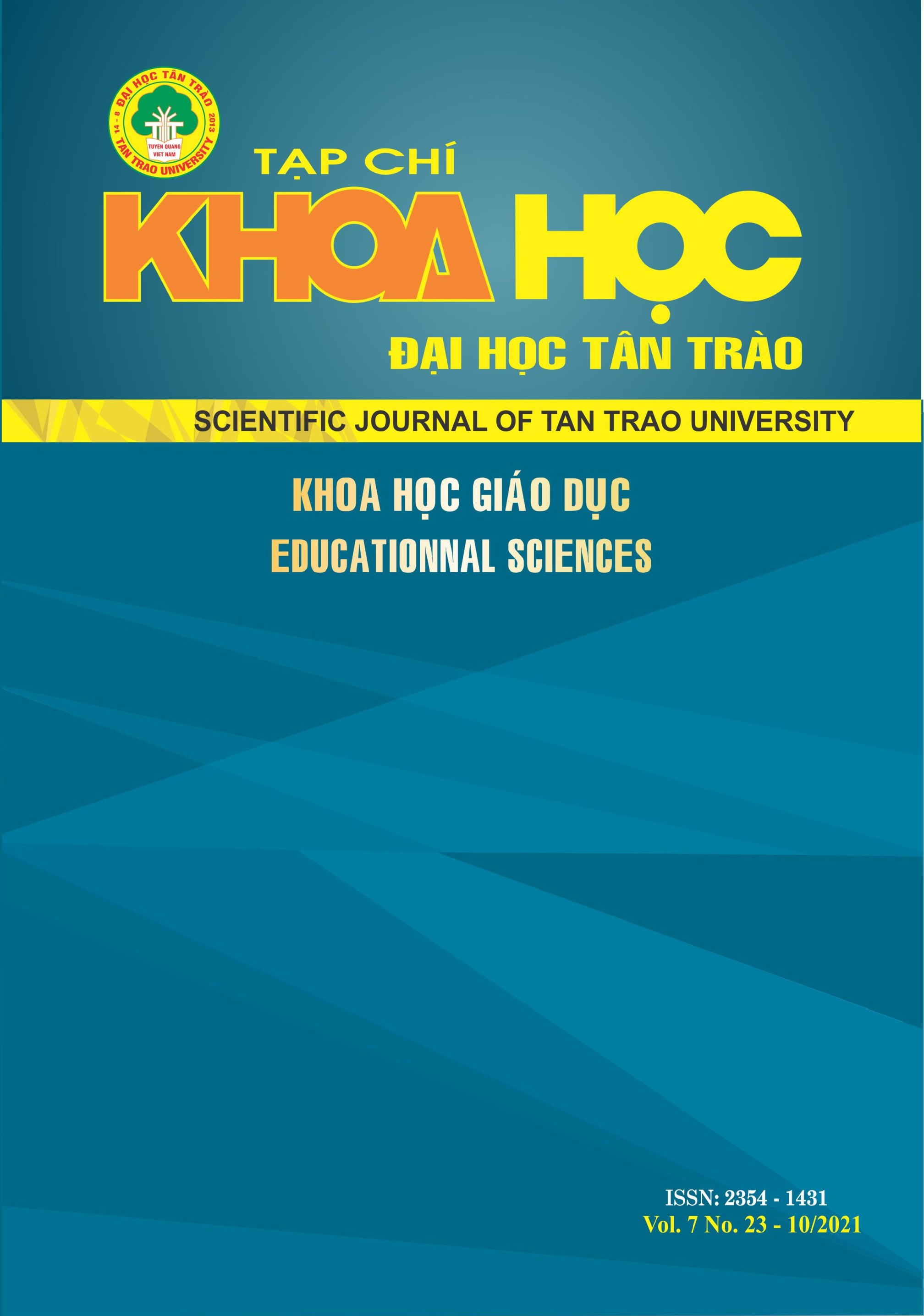THỰC TRẠNG SỬ DỤNG TRỊ LIỆU CHƠI PHÁT TRIỂN KĨ NĂNG CHÚ Ý CHO TRẺ KHUYẾT TẬT TRÍ TUỆ 3 - 6 TUỔI
DOI:
https://doi.org/10.51453/2354-1431/2021/636Tóm tắt
Nghiên cứu tìm hiểu thực trạng sử dụng trị liệu chơi phát triển kĩ năng chú ý cho trẻ khuyết tật trí tuệ 3 – 6 tuổi, xây dựng tiêu chí đánh giá kĩ năng chú ý và tiến hành nghiên cứu thực trạng mức độ phát triển kĩ năng chú ý của 30 trẻ khuyết tật trí tuệ 3 - 6 tuổi, kết quả cho thấy đa số trẻ khuyết tật trí tuệ 3 - 6 tuổi đạt mức độ phát triển kĩ năng chú ý ở mức trung bình và dưới trung bình. Nghiên cứu cũng xây dựng phiếu khảo sát ý kiến dành cho 35 giáo viên và cán bộ quản lí, 35 phụ huynh trẻ khuyết tật trí tuệ 3 – 6 tuổi nhằm tìm hiểu thực trạng sử dụng trị liệu chơi phát triển kĩ năng chú ý cho trẻ khuyết tật trí tuệ 3 – 6 tuổi, kết quả nghiên cứu cho thấy giáo viên, cán bộ quản lí, phụ huynh đều nhận thức đúng đắn về tầm quan trọng của việc sử dụng trị liệu chơi, tính hiệu quả, thuận lợi và khó khăn khi áp dụng trị liệu chơi, được xem là cơ sở thực tiễn để lựa chọn phương pháp hiệu quả trong quá trình phát triển kĩ năng chú ý cho trẻ khuyết tật trí tuệ 3 – 6 tuổi.
Tải xuống
Tài liệu tham khảo
[1] Axline, (1994) Dibs in search of self, To Thi Anh, translated by Vu Trong Ung, Tu Publishing House.
[2] Axline, V.M (1947). Play therapy. London: Churchill Livingstone.
[3] Barfield, S., Dobson, C., Gaskill, R. L., & Perry, B. D. (2012). Neurosequential model of therapeutics in a therapeutic preschool: Implications for work with children with complex neuropsychiatric problems. International Journal of Play Therapy, 21(1), 30-44. CA, USA: Association for Play Therapy.
[4] Bratton, S., Ray, D., Rhine, T., & Jones, L. (2005). The efficacy of play therapy with children: A meta-analytic review of the outcome research. Professional Psychology: Research and Practice, 36(4), 376-390.
[5] Brown, R. & Brown, I. (2005). The application of quality of life. Journal of Intellectual Disability Research, 49(10), 718 – 727.
[6] Vo Thi Minh Chi (2004), Neuropsychology, Hanoi National University Publishing House.
[7] Demanchick, S. P., Cochran, N. H., & Cochran, J.L. (2003). Person-centred play therapy for adults with developmental disabilities. International Journal of Play Therapy, 12(1).
[8] Diagnostic and Statistical Manual of Mental Disorders, Fifth Edition (DSM-5) (2013)
[9] Doan, P.V (1993), Children with delayed intelligence, Vietnam Education Publishing House.
[10] International Classification of Diseases for Motality and Morbility Statistics Eleventh Revision (ICD -11) (2018), World Health Organization.
[11] Hai, N.X. (2009), Education for children with disabilities, Vietnam Education Publishing House.
[12] Hanh, N.T. (2019), Assessment of children with intellectual disabilities, Vietnam Education Publishing House.
[13] Hang, L.T.T. (2015), Early intervention for children with disabilities, Vietnam Education Publishing House.
[14] Hue, T.T.X. (2015), Game Theory: “Game Technology in Early Childhood Education and Special Education”, Ho Chi Minh City University of Education Publishing House
[15] Hue, T.T.X. (2006), Collection of games to treat psychological disorders for preschool children with disabilities, Ho Chi Minh City University of Pedagogical University Publishing House.
Tải xuống
Đã Xuất bản
Cách trích dẫn
Số
Chuyên mục
Giấy phép

Tác phẩm này được cấp phép theo Giấy phép Quốc tế Creative Commons Attribution-ShareAlike 4.0 .
Bài báo được xuất bản ở Tạp chí Khoa học Đại học Tân Trào được cấp phép theo giấy phép Ghi công - Chia sẻ tương tự 4.0 Quốc tế (CC BY-SA). Theo đó, các tác giả khác có thể sao chép, chuyển đổi hay phân phối lại các bài báo này với mục đích hợp pháp trên mọi phương tiện, với điều kiện họ trích dẫn tác giả, Tạp chí Khoa học Đại học Tân Trào và đường link đến bản quyền; nêu rõ các thay đổi đã thực hiện và các nghiên cứu đăng lại được tiến hành theo cùng một bản quyền.
Bản quyền bài báo thuộc về các tác giả, không hạn chế số lượng. Tạp chí Khoa học Tân Trào được cấp giấy phép không độc quyền để xuất bản bài báo với tư cách nhà xuất bản nguồn, kèm theo quyền thương mại để in các bài báo cung cấp cho các thư viện và cá nhân.
Mặc dù các điều khoản của giấy phép CC BY-SA không dành cho các tác giả (với tư cách là người giữ bản quyền của bài báo, họ không bị hạn chế về quyền hạn), khi gửi bài tới Tạp chí Khoa học Đại học Tân Trào, tác giả cần đáp ứng quyền của độc giả, và cần cấp quyền cho bên thứ 3 sử dụng bài báo của họ trong phạm vi của giấy phép.






